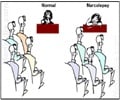Scientists in Japan have identified a genetic mutation linked to narcolepsy, a disease that can cause someone to doze off in mid-sentence or behind the wheel of a car, a study released Sunday reports.
A genetic mutation linked to narcolepsy has been identified by Japanese scientists. Narcolepsy is a disease that can cause someone to doze off in mid-sentence or behind the wheel of a car.
Other symptoms of the condition, which shows up in late adolescence or early adulthood, include excessive daytime drowsiness, vivid hallucinations on the threshold of sleep, and the sudden, temporary loss of muscle control, often triggered by emotional shock.A team of researchers led by Katsushi Tokunaga at the University of Tokyo compared the genetic profiles of persons with and without the sleep-inducing disease.
Across four different ethnic groups, patients with narcolepsy were far more likely to carry a specific mutation of DNA located between two genes, one of which has been associated with sleep regulation and the other with the sleep-wake cycle.
The statistical link was strongest among Japanese, but remained significant among Europeans and persons of African descent as well.
The study also showed that the suspect genetic variant -- known as rs57770917 -- is common among Koreans.
The prevalence of the disease varies widely in different countries. In Europe and the United States, narcolepsy is roughly as common as Parkinson's disease or multiple sclerosis, affecting on average one in every 2,500 people.
Advertisement
There is no known cure for narcolepsy, which is often treated with stimulants to combat daytime fatigue.
Advertisement
An immediate family member with narcolepsy increases one's chances of having the disease by 10 to 40 times.
It was found that all Japanese suffering from the disease carried another genetic variant. But fully ten percent of the Japanese population shared that same mutation, so researchers suspected the existence of additional genetic drivers as well.
The authors of the new study said their findings could point the way to "new therapeutic approaches" designed to target the neurochemical reactions patterned by the wayward genetic material.
The research was published in journal Nature Genetics, part of the British-based Nature Publishing Group.
Source-AFP
RAS/SK















